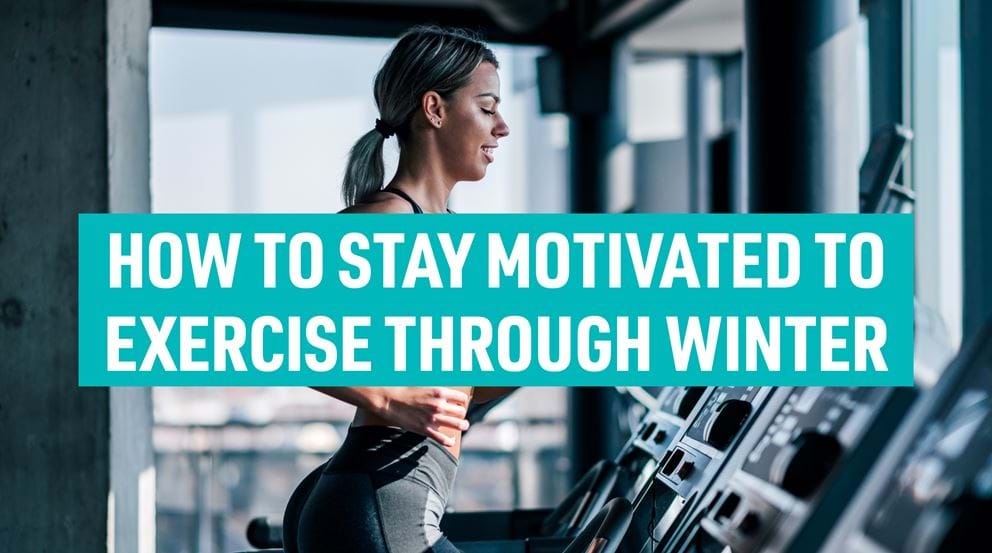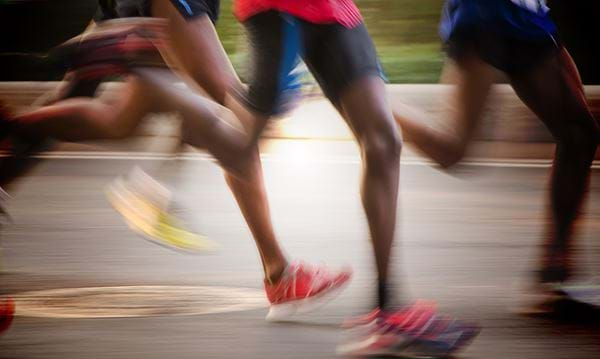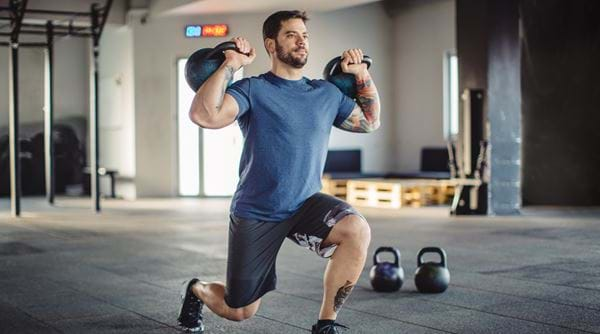How to Stay Motivated To Exercise through Winter

If the shorter days and darker evenings are starting to take a toll on your workout routine, you’re not alone. With the clocks going back, there’s less daylight than ever, and the daylight we get is getting increasingly more grey, it can be tempting to swap your workouts for cosy sofa sessions in front of the TV.
While taking the odd rainy day off won’t have a negative impact, exercise is actually a key way to look after your mental and physical health and keep you happier during the winter months.
We know the idea of training in the dark and rain may not seem as appealing as your summertime workouts in the sunshine, so we’re sharing tips from our Personal Trainers to help keep you motivated over winter.
Why is exercising in winter so hard?
It’s not just the thought of working out in winter that feels so hard; exercising itself is more challenging in the cooler and damper weather, so even if you manage to get out of the house and get started, you might find your workout more difficult than usual. Colder temperatures mean more energy is needed to warm up the muscles and joints properly, and the body needs to work harder to stay warm during the workout. With a lot more energy being used to stay warm, you may find yourself with less energy for your exercises. While this can seem like a lot of effort, it’s important not to skip warming up as we are more prone to injuries when cold!
With extra energy being used up during your cooler workouts, it’s important to be mindful of your nutrition intake and make sure you are properly fuelling up before and after your workouts. Check out this blog to learn more about what you should eat before, during, and after your workout to reach your goals.
The winter days don’t just make it physically harder to workout, it can also make for some mental barriers. The The darker mornings and evenings can leave us feeling sleepy and lethargic, while the colder weather makes the thought of leaving the house to exercise much less tempting. And even for those with the best intentions, the change in season can lead many to have low energy levels and reduced motivation, and even causing seasonal mood disturbances like seasonal affective disorder..
Fortunately, exercising can help to combat the winter blues by boosting energy levels and getting those endorphins flowing. To get these benefits, you just need to get started – but as this can be easier said than done, we’ve outlined some of our PTs’ best advice and top tips to keep you moving!
-
Have a plan in mind
Jake Jamieson, one of our Liverpool PTs, says “If you are someone who goes into the gym and wings it with no plan, you might be more likely to lose interest and motivation because you are not achieving results. Put yourself in the best possible position with a solid plan to set you in the right direction to achieve your goals, and keep motivation high as a result.”
-
Recruit a workout buddy
Jamie Thorp, a PT at one of our Leeds gyms, suggests finding a friend to work out with. “Going to the gym alone is hard and winter seems to be a time when we may want to stay inside! Simply recruiting a workout buddy can be perfect to boost accountability and help those winter blues, plus it’s a warm and dry way to socialise.”
-
Stick to your routine and habits
Another tip from Jake is to develop a routine. “Regardless of the season it’s always important to remember motivation comes and goes and we can’t always rely on it. Creating habits and developing discipline will be what is going to keep you going, guiding you to ensure you’re doing the things you need to do from day to day.”
-
Set yourself goals that aren't just physique related
Whilst there’s nothing wrong with having aesthetic goals, solely focusing on these objectives can leave you feeling dejected and unmotivated as this kind of progress can often be slow and discreet.
Alongside your physique goals, consider setting some S.M.A.R.T. goals regarding your training. These will allow you plan each step of your goal setting, increasing the chances of long-term achievement whilst keeping you determined!
-
Get fully equipped
For Andrew Laidlaw, one of our Edinburgh PTs, getting the right kit is key to setting yourself up for success. “It's safe to exercise in winter conditions but you must be fully equipped with the appropriate kit. Wear plenty of layers including a waterproof jacket if needed, get appropriate footwear with good grip (especially if you’re exercising outdoors), and don't forget to keep your head and hands warm also, hats and gloves are essential. Keeping your body warm will reduce your chance of injury as well as make exercising less of a slog.”
-
Track your nutrition
Another tip from Andrew is setting nutrition goals. “It's fair to say that most people like to indulge a little more over the Christmas period. I know I do! Tracking your calories by using a food diary like MyFitnessPal is a great way to keep you accountable and on track to achieving your goals.”
Jamie Thorpe adds: “Although being mindful of your nutrition is important, remember to be kind to yourself during the process! If the thought of exercise throughout winter daunts you, try reducing your fat loss objectives and consider alternative methods such as lifestyle or nutrition, instead of just exercise. That way you won't feel so much pressure to exercise but you can still support your own health and fitness goals, hopefully leaving you more motivated in the process.”
-
Increase your NEAT
One of the most underrated ways of staying fit and keeping extra pounds off is by increasing your NEAT. NEAT stands for non-exercise activity thermogenesis and encompasses everything we do that is not considered planned exercise - for example, taking the stairs, cleaning, or getting off the bus a stop earlier. Increasing your NEAT can help you to stay on track with your goals, even on the days you don’t feel like working out. We’ve shared 7 tips to increase your NEAT here.
-
Plan to go for a walk in sunlight
While the weather in the UK is never amazing, we get even sunlight exposure during the winter, meaning the nights get darker earlier! Going out for a walk in the day can to boost your vitamin D levels which will help keep your energy up throughout the day, as well as help to regulate your circadian rhythm and lead to better sleep.
-
Remember to stay hydrated and cool down appropriately
The cooler temperatures may not make you feel as thirsty or as sweaty, however ensuring to stay hydrated and maintain effective cooldowns is still just as important during the winter months to aid performance, prevent muscle soreness, and reduce injury risks!
The winter season can make exercising more challenging but keeping up with a routine will help to stave off the winter blues and stand you in good stead for the spring and summer periods. Remember to set attainable goals, listen to your body and be kind to yourself on the days you struggle. You can check out our blog for more fitness tips and advice.
If the thought of exercising outside in winter is a big no, you can find your nearest gym here.


